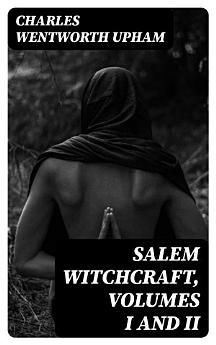Salem Witchcraft, Volumes I and II: With an Account of Salem Village and a History of Opinions on Witchcraft and Kindred Subjects
Charles Wentworth Upham
Sep 2022 · DigiCat
Ebook
100
Pages
family_home
Eligible
info
reportRatings and reviews aren’t verified Learn More
About this ebook
In "Salem Witchcraft, Volumes I and II," Charles Wentworth Upham meticulously chronicles the infamous Salem witch trials of 1692, offering a detailed examination of the socio-political and religious factors that fueled this historical calamity. Upham employs a scholarly prose that combines narrative storytelling with rigorous historiographical analysis, revealing the complexities and tragedies intertwined with the witchcraft accusations. His work remains a pivotal study in American history, reflecting the pervasive fears and superstitions that can lead societies to moral panic and injustice, thus encapsulating the broader Puritanical context of early New England society. Charles Wentworth Upham was a prominent historian, politician, and clergyman, with deep roots in New England culture. His passion for understanding the interplay of religion, law, and social dynamics in colonial America can be traced to both his educational background and his personal ties to the region. Upham's dedication to uncovering the truth behind historical events was reflected in his extensive research, and he sought to provide a detailed account that would serve as both a warning and a source of understanding for future generations. Upham's "Salem Witchcraft" is highly recommended for scholars, students, and anyone captivated by the intricacies of human behavior during crises. This monumental work not only sheds light on a dark chapter of American history but also serves as a cautionary tale about the dangers of hysteria and the fragility of justice in society.
About the author
Charles Wentworth Upham (1802-1875) was a significant figure in 19th-century American literature, particularly known for his historical works on the Salem witch trials. As a native of St. Johnsbury, Vermont, and later a resident of Salem, Massachusetts, Upham had a personal connection to the region's history. He graduated from Harvard College in 1821 and Harvard Divinity School in 1824, beginning his career as a Unitarian minister before transitioning into politics as a member of the Massachusetts State Legislature and subsequently serving as Mayor of Salem and a member of the U.S. House of Representatives. Upham's scholarly pursuits led him to delve deep into the history of Salem and its infamous witch trials of 1692. His magnum opus, 'Salem Witchcraft, Volumes I and II,' published in 1867, stands as an exhaustive historical account of this dark chapter in American colonial history. In his work, Upham thoroughly examines the societal conditions, individual biographies, and legal proceedings of the time, offering readers a meticulously detailed narrative infused with his 19th-century Unitarian sensibilities. His literary style, marked by the precise detailing and moral didacticism common to the period, reflects both his clerical background and his dedication to historical accuracy and the edification of his readership.
Rate this ebook
Tell us what you think.
Reading information
Smartphones and tablets
Install the Google Play Books app for Android and iPad/iPhone. It syncs automatically with your account and allows you to read online or offline wherever you are.
Laptops and computers
You can listen to audiobooks purchased on Google Play using your computer's web browser.
eReaders and other devices
To read on e-ink devices like Kobo eReaders, you'll need to download a file and transfer it to your device. Follow the detailed Help Center instructions to transfer the files to supported eReaders.







